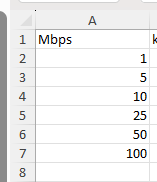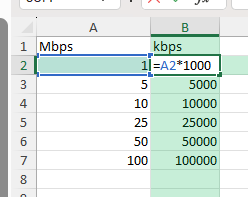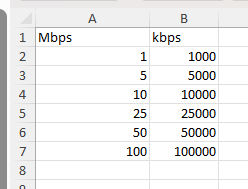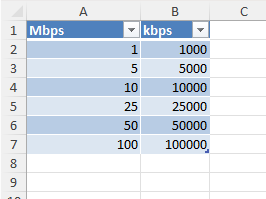Key Takeaways
- 1 Mbps equals 1000 kbps
- You can multiply Mbps by 1000 using simple Excel formulas
- Helper columns make large-scale conversions manageable
- Excel supports VBA to automate Mbps to kbps conversions
- Power Query can be used for batch data transformations
Table of Contents
Why Convert Mbps to Kbps?
Understanding the Need for Conversion
When navigating the world of internet speeds, you often encounter different units that might cause confusion if you’re not familiar with them. Mbps (Megabits per second) is a common measurement for internet speed, while Kbps (Kilobits per second) is used less frequently in today’s high-speed internet world. However, converting between these units can be essential for accurately understanding bandwidth, especially when evaluating network appliances or services across various technical specifications. This conversion allows you to gain a clearer understanding of data speed and helps in making informed decisions whether you’re comparing service plans or optimizing your network.
Real-World Applications
Converting Mbps to Kbps is not just a technical exercise; it’s a practical tool in numerous real-world scenarios. For network administrators, this conversion aids in optimizing network resources, ensuring that your bandwidth is effectively allocated to meet users’ demands. IT professionals often rely on this conversion to troubleshoot network performance issues, converting data rates to more comprehensible units for precise monitoring and diagnostics.
In consumer contexts, understanding these conversions helps when selecting an internet service plan. Some providers advertise speeds in Mbps, while applications or services might display requirements in Kbps, necessitating a conversion for clear comparison. Gamers and video streamers might find conversions useful to determine if their current internet speed can handle high-definition content without buffering.
Steps to Convert Mbps to kbps in Excel
Step 1: Enter the Mbps Values
Start by entering your Mbps values in a column. For example, input the values 1, 5, 10, 25, 50, 100 in cells A2 through A7.
Step 2: Create a Conversion Formula
In the adjacent column, enter the formula =A2*1000 to convert the value in A2 from Mbps to kbps.
Drag the formula down the column to apply it to all rows.
Step 3: Use Named Ranges or Structured Tables
If you are working with a large dataset, consider converting the range into an Excel Table (Ctrl + T) and referencing column headers for clarity.
Common Mistakes and How to Fix Them
Incorrect Multiplication: Double-check that you’re multiplying by 1000, not 1024.
Missing Units: Clearly label your columns to avoid confusion between Mbps and kbps.
Formula Not Applied to All Rows: Drag the formula or double-click the fill handle to apply it down.
Data Overwritten: Make sure formulas are not overwriting raw data. Keep them in a separate column.
Bonus Tips and Advanced Scenarios
Using POWER QUERY: Import your Mbps data and add a new column using a calculated column: [Mbps] * 1000.
Using VBA: Automate the conversion with this macro:
Sub ConvertMbpsToKbps()
Dim cell As Range
For Each cell In Selection
If IsNumeric(cell.Value) Then
cell.Offset(0, 1).Value = cell.Value * 1000
End If
Next cell
End Sub
Conditional Formatting: Highlight values above a certain kbps threshold to identify fast data speeds.
Exploring Related Units
Difference Between Kilobits and Kilobytes
Though they sound similar, kilobits (Kb) and kilobytes (KB) refer to distinctly different data measurements. A kilobit is 1,000 bits, while a kilobyte is made up of 8,000 bits (as there are 8 bits in a byte). This distinction is crucial when understanding data transfer rates versus storage measurements, as these units are often confused due to their abbreviations and similar names.
When dealing with data transfer, typically measured in kilobits per second (Kbps) or megabits per second (Mbps), the smaller unit is often more applicable for describing file downloads or streaming requirements. On the flip side, storage space or file sizes are expressed in kilobytes (KB) or megabytes (MB). Misunderstanding these units can lead to incorrect interpretations of data needs or the purchase of unsuitable network or storage solutions.
With this knowledge in hand, you can ensure that you’re accurately matching your system capabilities with your needs, be it in tech setup, data plan selection, or understanding digital product descriptions.
Conversion to Other Data Transfer Units
Beyond converting Mbps to Kbps, it’s useful to know about other conversions among data transfer units to widen your understanding of bandwidth capacities. A common conversion might involve moving from Mbps to Bytes per second (Bps), where 1 Mbps equals 125,000 Bps. This conversion is crucial in certain fields where data throughput is expressed in bytes rather than bits, such as in data center operations or specific application requirements.
Another consideration involves Gigabits per second (Gbps), often used in enterprise-level network infrastructures. With 1 Gbps equaling 1,000 Mbps, converting to this unit helps in scaling up network capacity for large organizations or data-heavy applications, like cloud computing or high-frequency trading platforms.
Understanding these conversions provides flexibility and clarity when comparing diverse data plans, services, or network equipment. It gives you the analytical edge whether you’re calculating necessary bandwidth for a new office setup or assessing the capabilities of internet service providers. This knowledge ensures you deploy the right technology for your specific data needs.
Frequently Asked Questions
What is the conversion factor from Mbps to kbps?
1 Mbps is equal to 1000 kbps.
Can I use the CONVERT function in Excel for Mbps to kbps?
No, Excel’s CONVERT function does not support data rate units. Use simple multiplication instead.
Is 1 Mbps equal to 1024 kbps?
In networking, 1 Mbps = 1000 kbps. The 1024 factor is used for bytes, not bits.
Can I automate this conversion for many rows?
Yes, use fill-down formulas, Excel Tables, Power Query, or VBA.
Can I do the reverse (kbps to Mbps)?
Yes. Use the formula =kbps/1000 to convert back to Mbps.
John Michaloudis is a former accountant and finance analyst at General Electric, a Microsoft MVP since 2020, an Amazon #1 bestselling author of 4 Microsoft Excel books and teacher of Microsoft Excel & Office over at his flagship MyExcelOnline Academy Online Course.











